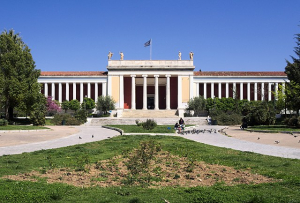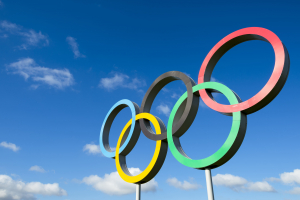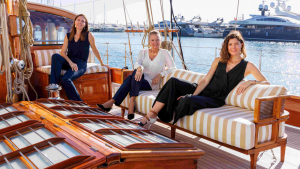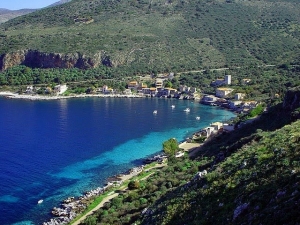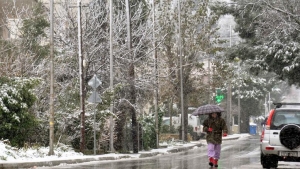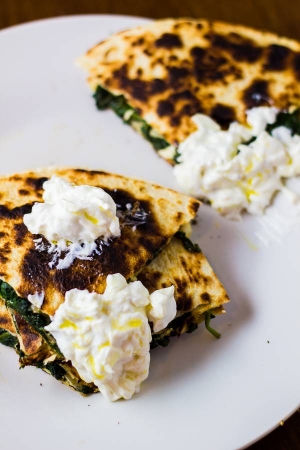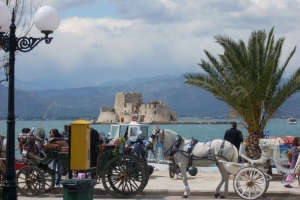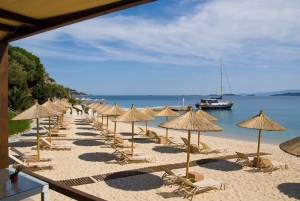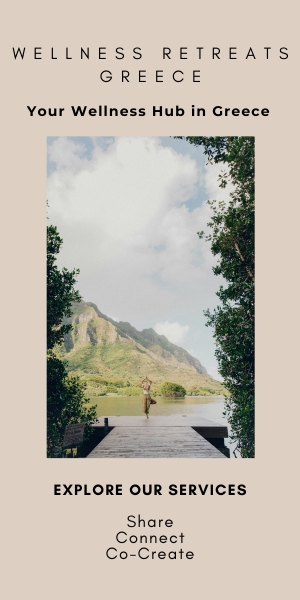Nearly five decades ago, a chance encounter in Athens forever changed the course of her life. What began as a magical introduction to Greece—and to her future husband, Bill Lefakinis, founder of Valef Yachts—evolved into a lifelong journey of love, family, and leadership in the world of luxury yachting. In this interview, she shares her story of adapting to Greek life, the lessons learned from building a family legacy, and why Greece continues to shine as one of the world’s most treasured yachting destinations.
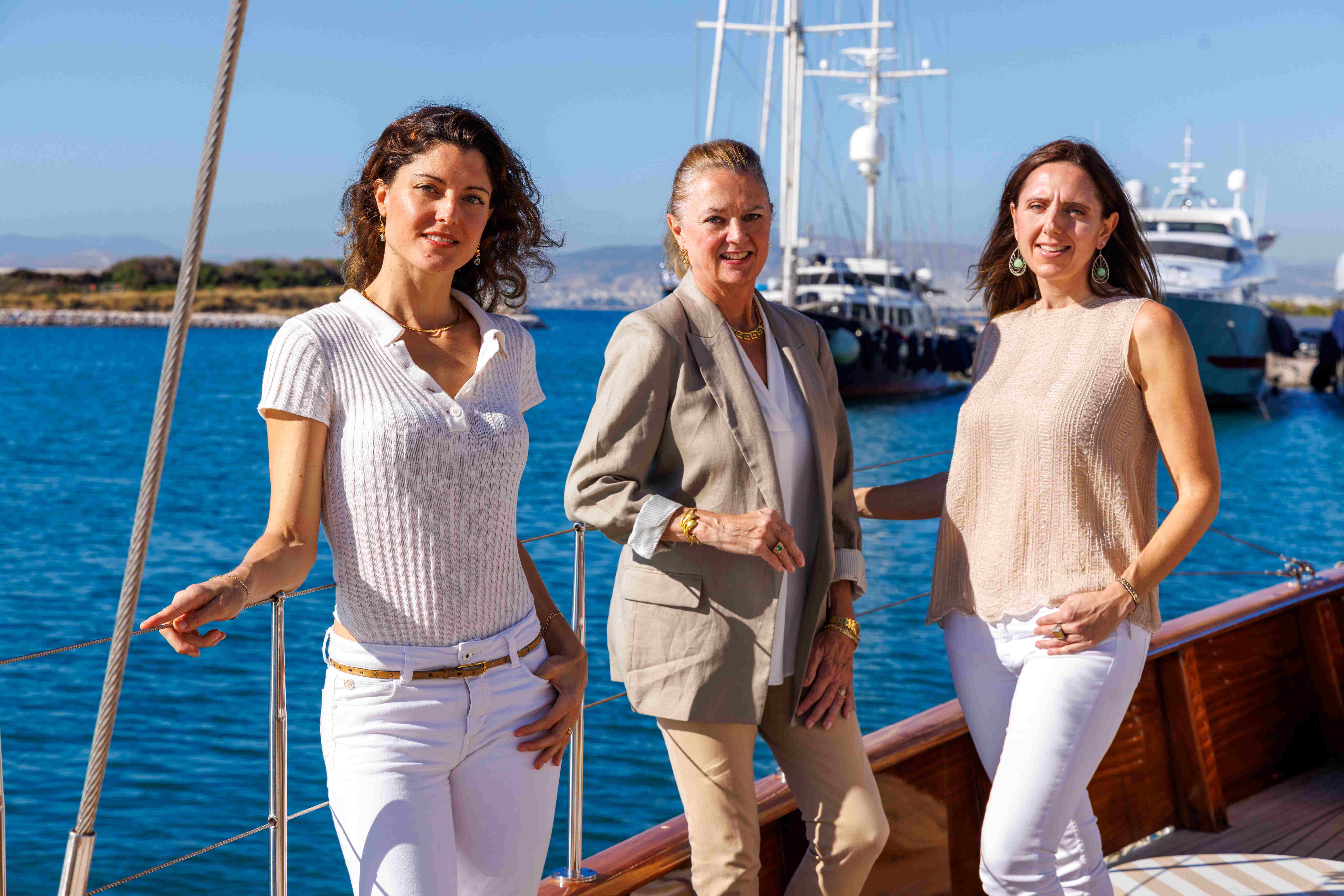
Q: How did you first come to Greece and meet your husband, Bill?
As fate would have it, an ex-boyfriend had just returned from Greece, where he had finalized plans to charter a yacht for his family. While there, he met Bill Lefakinis, the owner of Valef Yachts, and they quickly became friends. When I arrived in Greece, my friend insisted I meet Bill.
On the second day of my trip, after an island excursion, Bill picked us up in Athens and suggested a quick stop. That “stop” turned out to be the yacht my friend had selected, gleaming in Vouliagmeni Marina, crew in uniform, champagne and meze waiting. It was magical. Later that night, after dinner in Mikrolimano Port, Bill surprised me by asking me to marry him. I laughed, of course, how could I marry someone I’d just met? I told him I’d need to love him, meet his family and friends, and truly know him first. Still, I found him incredibly intriguing, and our story began from there.
Q: What was it like adjusting to life in Greece?
My three-week journey through the islands was transformative. I visited historical sites, museums, churches, and beaches; I savored traditional cuisine, swam in the crystal-clear Mediterranean, and let the culture and people wash over me. Greece became a part of me; I felt at peace and deeply grateful.
When I eventually settled there with Bill, the adjustment felt effortless. I embraced the slower pace—lunches on our balcony overlooking Marina Zeas, afternoon naps, evenings by the sea, and mornings shopping at bustling open-air markets full of fresh produce, seafood, and spices. Life was idyllic, but I wanted mental stimulation. Slowly, I began helping at Valef Yachts, listening in on meetings, taking small tasks, and immersing myself in the world of Greek yachting. That step grew into a lifelong career.
Q: Do you personally identify as Greek? How has the country influenced your life and leadership style?
While I wasn’t born Greek, living in Greece for decades—raising a family, building a business, and immersing myself in the culture—has made me feel deeply connected to the country. In many ways, I identify as Greek.
Greece has shaped my lifestyle and leadership, teaching me the value of relationships, resilience, and hospitality. Business here is personal, built on trust and connection, and that philosophy guides how I lead at Valef.
Living in Greece also instilled a sense of balance—slowing down, appreciating beauty, and being present—which keeps me grounded in both life and business.
Q: Over the years, Greece has changed a lot socially and economically. How do you feel it has evolved since Valef’s early days?
Since I first came to Greece nearly 47 years ago, the country has changed dramatically. Life used to move at a slower, more relaxed pace, with cherished traditions like midday siestas and long coffees with friends. There was a simplicity that felt rich and fulfilling.
Today, Greece is faster-paced and more globalized, with technology transforming work, communication, and business. While I appreciate these modern conveniences, I sometimes miss the personal rhythm of the past.
Yet the spirit of hospitality, the warmth of the people, and the deep cultural roots remain what continues to make Greece truly special.
Q: What does yachting mean to you personally, beyond the business side? What draws people to this lifestyle in your experience?
To me, yachting is a way of life. It offers the freedom to explore destinations in comfort and privacy, while immersing yourself in the natural beauty, culture, and rhythm of each place you visit.
What makes yachting truly special is the seamless blend of exploration and personalized hospitality. Clients get to discover new islands, hidden coves, and charming seaside towns, all without the hassle of packing and unpacking or changing hotels. Each day offers something new, yet everything is tailored to their pace and preferences.
Yachting creates a luxurious yet intimate way to travel. It brings people closer to the destination, to each other, and to a slower, more meaningful way of experiencing the world. I’d call it a transformative escape.
Q: Why do you think Greece has become one of the world’s top yachting destinations? What makes it so special compared to other places?
Greece offers a unique blend of natural beauty, history, and hospitality that makes it unlike any other yachting destination. With more than 7,000 islands and endless coastline, the cruising options range from cosmopolitan hubs to quiet, untouched coves.
The long sunny seasons, calm seas, and favorable winds create ideal conditions, but it’s the warmth and hospitality of the Greek people—along with the country’s rich history and culture—that make each journey truly special.
Today, Greece also boasts world-class yachts and modern marinas, ensuring top-tier service and infrastructure. Together, these elements—climate, geography, culture, and fleet—make Greece an unbeatable destination for luxury yachting.
Q: Are there any particular Greek islands or hidden gems that you love personally and would recommend to someone exploring the Greek islands by yacht?
Hydra holds a special place in my heart. I have countless fond memories from over the years, and I love that it has managed to preserve its traditional charm and character. With no cars on the island, just donkeys and walking paths, Hydra offers a peaceful, elegant atmosphere that feels like stepping back in time.
That said, we never take a one-size-fits-all approach when it comes to itineraries. One of the most rewarding aspects of yachting is the ability to tailor each journey to the specific needs and desires of the charter group. Whether it's a family with young children, a group of friends, or a couple seeking a romantic getaway, we design every route around their interests—be it vibrant, cosmopolitan islands with nightlife and shopping, or secluded, off-the-beaten-track destinations rich in nature, history, and local flavor.
The beauty of Greece is in its diversity, and yachting allows you to discover it in a way that’s entirely your own.
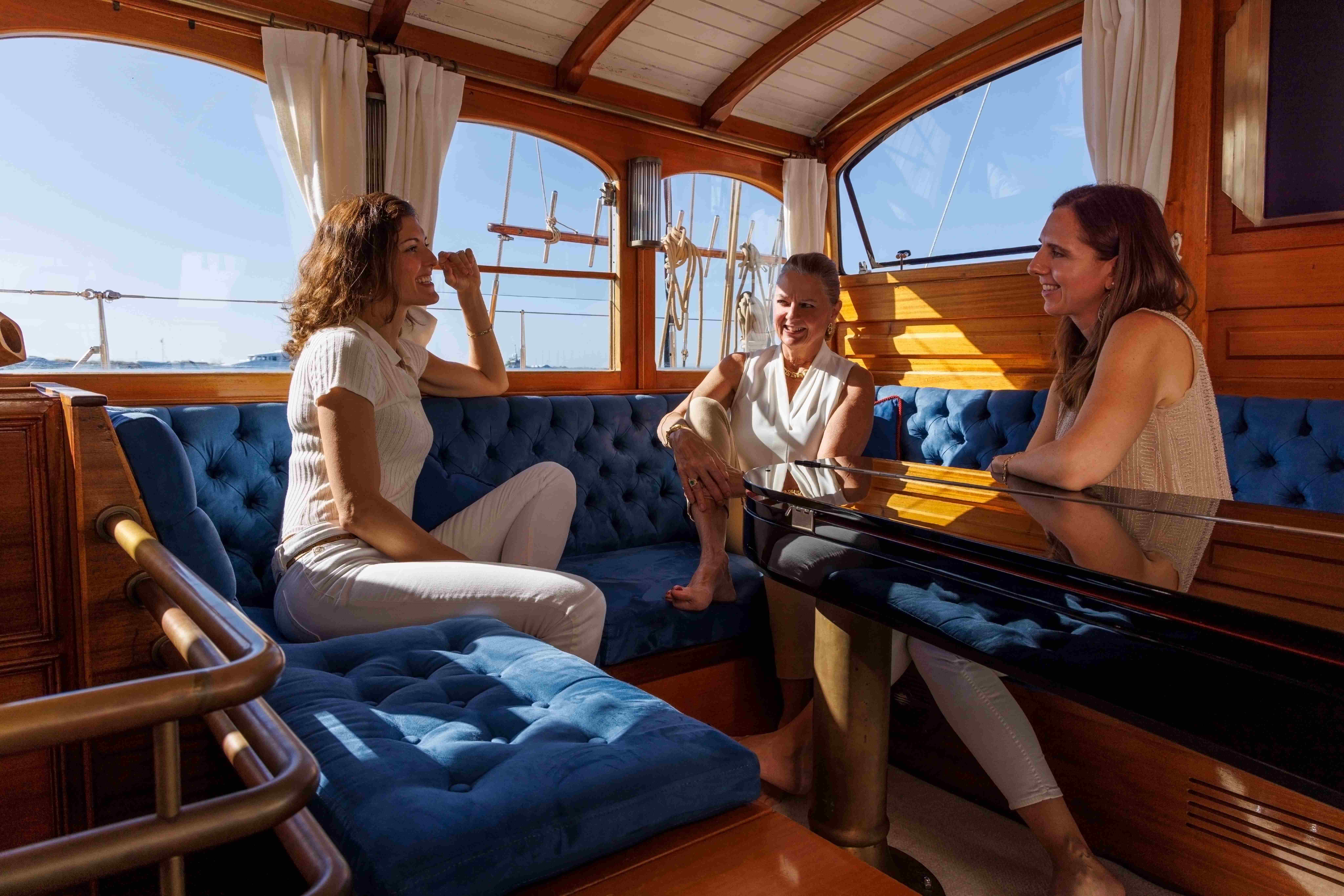
Q. Valef Yachts has hosted some of the most famous personalities and produced unique experiences for decades. Is there a particular moment or charter that stands out to you as especially memorable?
There have been countless special charters, but what resonates most is the genuine gratitude we receive from guests—whether it’s a world-famous actor or a family on their first yacht holiday. That heartfelt appreciation is always what stays with me.
Some gestures, though, stand out. I’ll never forget Robert (RJ) Wagner arriving at the dock with a case of hand-picked wines, carrying them aboard himself as a thank-you to Bill and me. Or the Sheik who returned after his cruise to gift me a necklace—and another for my unborn daughter at the time—a gesture that touched me deeply.
It’s these acts of kindness and connection that make this work so meaningful. Every charter tells a story, and we’re honored to be part of those journeys
Q: Running Valef Yachts today, what are some of the biggest challenges and opportunities you face in the luxury yachting industry, both locally and globally?
One of the biggest challenges we face today is over-tourism. Many Greek islands, once serene and authentic, are now crowded during peak season, affecting both the guest experience and local communities. At Valef, we address this by curating mindful itineraries, introducing lesser-known destinations, and creating opportunities for cultural immersion away from the crowds.
Another challenge is maintaining the high standards of service that define luxury yachting. As the industry expands, more small operators have entered the market, but not all uphold the level of quality and reliability we expect. At Valef, we carefully choose our partners, emphasizing trust, professionalism, and transparency to ensure every charter lives up to our standard.
At the same time, opportunities are abundant. Travelers increasingly seek authentic, private, and personalized experiences. Innovations in sustainability, technology, and onboard services also allow us to enhance guest journeys while operating more responsibly.
Our goal is to continue evolving while staying true to our legacy: offering unparalleled service, expert knowledge, and unforgettable voyages through Greece and beyond.
Q. As a woman leading a historic company in Greece, how do you perceive the landscape for women entrepreneurs and leaders in the Greek business world today? Has it changed since you started?
I’m proud to be one of the very few women who have been part of the yachting industry in Greece for over 45 years. When I first started, it was an overwhelmingly male-dominated field, especially in leadership roles.
Over the years, I’ve witnessed a slow but meaningful shift. Women have begun to carve out their space in the industry, becoming yacht brokers, managers, even captains, and gaining the recognition they deserve. While progress has been gradual, it’s certainly moving in the right direction.
What brings me the greatest pride today is seeing my two daughters at the helm of Valef Yachts' main office in Greece. It’s incredibly fulfilling to watch the next generation of women lead with confidence, professionalism, and grace. Their presence—and that of other talented women in the industry—is helping reshape the future of yachting and the broader business world in Greece.
Q: Your two daughters are involved in the business as well. How does it feel to have a multi-generational family legacy in yachting? What values do you hope to pass on to them?
It’s deeply fulfilling to see my two daughters carrying forward the legacy of Valef Yachts. What began as a business my husband and I built over four decades ago has grown into a multi-generational story rooted in passion, commitment, and a love for Greece and the sea.
The values I hope to pass on to them are integrity, respect, and genuine hospitality. My hope is that they always lead with kindness, uphold high standards, and never lose sight of the personal connection that makes our work so meaningful.
Watching them thrive, shaping the future while honoring the past, makes me incredibly proud. Valef Yachts is more than a business; it’s our family’s legacy.
Q: Balancing such a demanding role with personal life can be challenging. How do you maintain that balance, and what advice would you give to others striving for it?
Raising children while managing a business is never easy. But one of the advantages of running your own company is having the flexibility to shape your schedule. In the yachting world, the seasonality of the business means there are intense periods, especially in summer, but also quieter times that allow for more family focus.
What’s helped me most is having a strong family unit. During the busiest times, we work together, support one another, and stay grounded in what really matters. For me, family has always come first, and I believe that keeping those priorities clear is essential to maintaining balance.
My advice to others is this: set boundaries, honor them, and don’t be afraid to slow down when needed. A strong work ethic is important, but it should never come at the expense of your well-being or relationships. True success is being able to build a life you love, both professionally and personally.
Q: Other than yachting, do you have a personal vision for anything else professionally?
Beyond yachting, one of my deepest passions lies in preserving the ecology of the seas. Having spent much of my life surrounded by the beauty and serenity of the Mediterranean, I feel a strong responsibility to protect these waters for future generations.
Valef envision’s becoming more involved in marine conservation efforts, whether through partnerships, advocacy, or educational initiatives that promote sustainable practices within the yachting industry and beyond. The health of our oceans is directly tied to the success of our industry and the well-being of the planet.
Professionally, I see great opportunity in encouraging more eco-conscious choices within luxury travel. From reducing plastic use on board to supporting green technologies in yachting, we all have a role to play in protecting the marine environment.
Q: What’s the best way for someone to connect with you for a yachting experience?
While I always welcome a good old-fashioned phone call, we know that most people today prefer the convenience of email, text, or WhatsApp—and we’re happy to communicate however you feel most comfortable.
You can reach us at:






